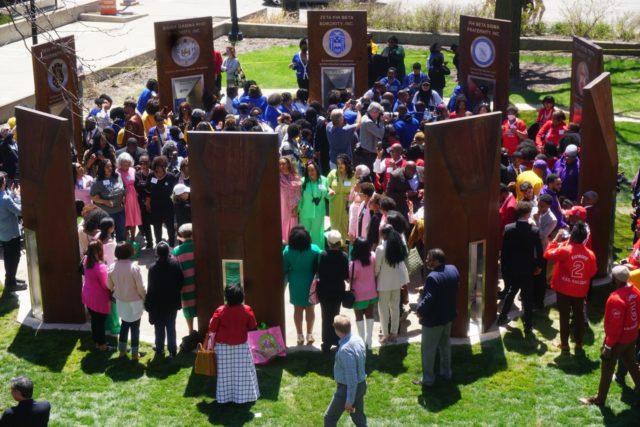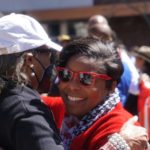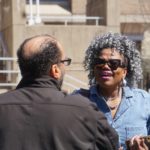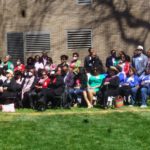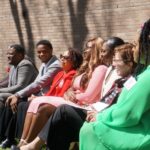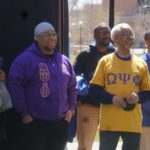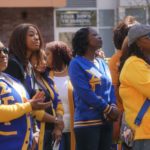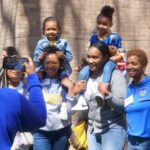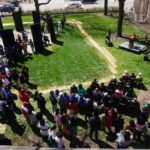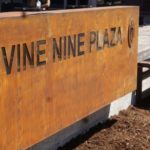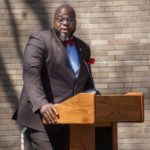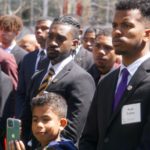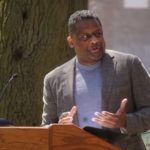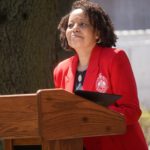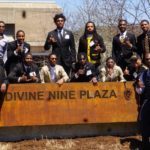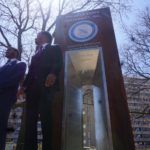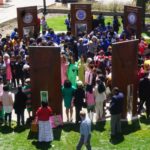Hundreds of members and alumni of UW-Madison’s historically Black fraternities and sororities gathered on East Campus Mall Saturday to bear witness to the unveiling of the Divine Nine Garden Plaza, the first physical manifestation of the National Pan Hellenic Council’s presence in its 75 year history at the state’s flagship university.
“This is hugely important, just for representation on a predominately white campus. To have that sense of belonging, a place where we as Black people, as Black sororities and fraternities can feel a sense of belonging on this campus is long, long, long overdue,” said Vanessa McDowell, an alum of the Delta Sigma Theta sorority and CEO of the Madison YWCA. “This is a legendary day. This is a day that is historic for us.”
McDowell’s mother Candace, the founding director of UW’s Multicultural Student Center, helped create a database of NPHC alumni to seek support for the project. The McDowell family made one of the major donations to build the nine monumets, each of which stands about 10 feet tall and bears the names of the charter members, as well as the organization’s motto and history.
“It was truly a pleasure to have had the opportunity to work on this project with a phenomenal group of committee members and to serve just campus in this way,” Candace McDowell said.
The Divine Nine Garden Plaza grew from demands made of UW administration by the Student Inclusion Coalition, which formed after a 2019 Homecoming video, themed “Home is Where We Are,” completely excluded students of color, even though video of NPHC member students was filmed.
UW alum and future medical student Nyla Mathis said she was told the footage of Black students was “too dark” to be used in the final video — a statement that felt a lot like what she heard as an insult in her childhood.
“For that to be said to me, at that time, as an adult, it really hurt,” Mathis said. “And it made me feel excluded from a community that I once thought I was a part of. So this time, rather than contain my race away from the things that hurt me more, I use this opportunity of exclusion, to invest in inclusion.”
Fellow Student Inclusion Coalition cofounder Israel Oby said students are often excited to arrive on campus and use their voice to uplift the community, only to find that voice being silenced or ignored.
“For me, these monuments aren’t just a representation of the amazing work these NPHC organizations, although I’m very grateful to finally see these historical organizations properly, but these monuments to me are also a representation of the fact that our voices matter to the generations of students of color on this campus that tried to use their voice, and walked away feeling defeated and silenced,” he said. “Let this monument be the reminder to you that you didn’t speak up in vain, that your voice made an impact, and that we wouldn’t be standing here today if it wasn’t for your boldness and your advocacy.”
“This is a big deal, because it honors a lot of black students who are part of these Greek organizations,” said Delta Theta Sigma alum Jessica Franco-Morales. “They were able to find community by joining these organizations that originally were made to exclude people of color at a predominantly white institution. This is just a long time coming. It’s bearing the fruits of a lot of people’s labor. There’s been a lot of people working on this for many years. And it’s great to actually see it come to fruition.”
She also said the location is important.
“I think it’s critical that it’s on East Campus small, right, it’s not hidden behind the building, or somewhere nobody goes, this is a prominent, highly visible area on campus,” she said.
That visibility is important as a representation of the university, said Monte McDowell, brother of Vanessa.
“What’s being overlooked is how this makes the campus look to folks who are not in our fraternities and sororities, folks who are visiting from out of town, that it’s an inclusive campus, which is not the message that the university has sent out in the past. I think it’s just important, not just for us to have a sense of belonging, but it’s also for other people to see that we’re here as well,” said McDowell, who now owns a clinical lab testing service in Atlanta.
“We were quite proactive as far as trying to make sure we had a voice here on campus,” said Cornelius May, one of the charter members of Phi Beta Sigma, which was chartered at UW in 1979. “We didn’t have a space to do what we wanted to do at the time. But this right here kind of gives you, even though you may not have a house, or whatever, but just to give you this monument here today gives you a place where you can say, hey, this is our home. We do exist here. We are here.”
Payton Wade, another Student Inclusion Coalition cofounder, said the monument gave her a sense of belonging she hasn’t felt before.
“I want to excitedly say that I’m so proud to finally feel like a Badger,” she said.

























